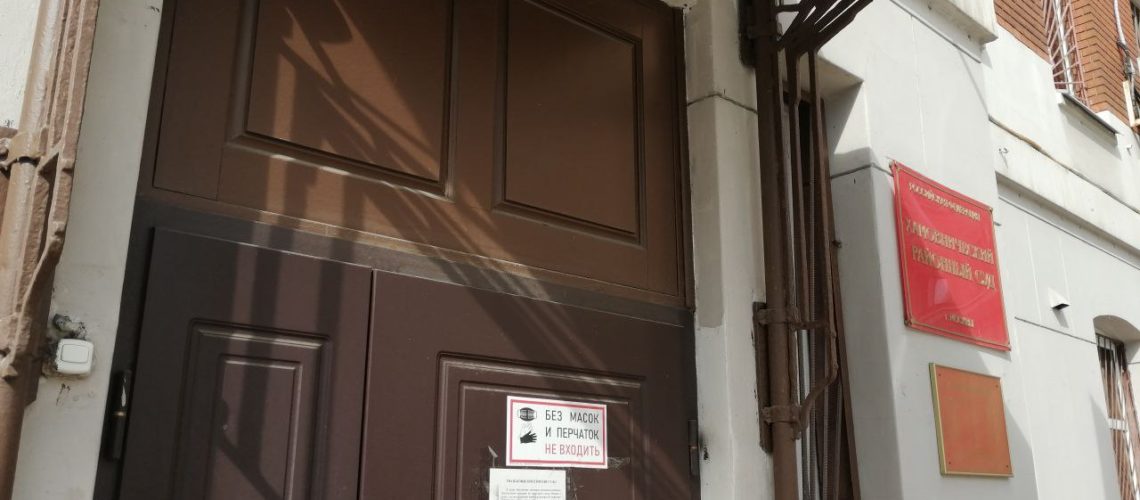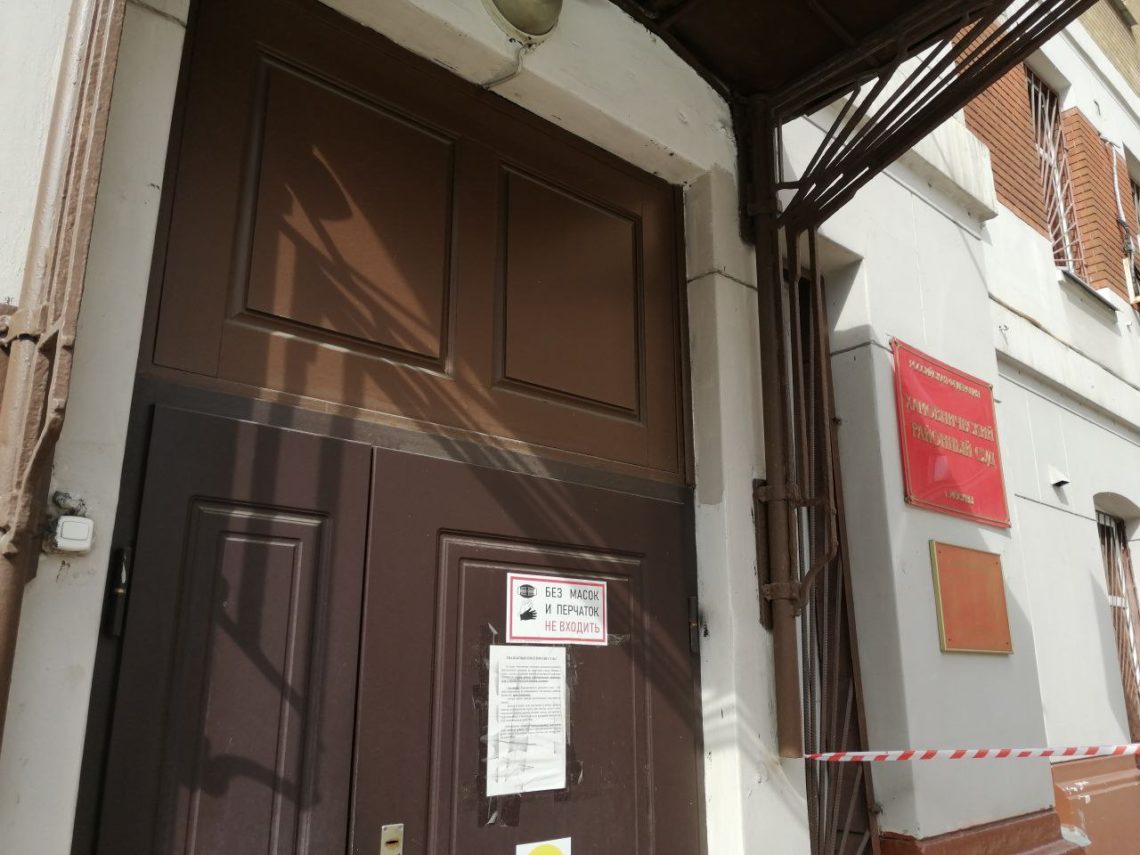

About the case:
Moscow police drew up a protocol for “discrediting” the Russian Armed Forces under Article 20.3.3 of the Code of Administrative Offense of Russia for a poster with a quote from writer Leo Tolstoy. The picket took place on March 24 near the Cathedral of Christ the Savior.
The case was heard by the Khamovnichesky district court of Saint-Petersburg, April 5 at 13:00.
At 13.01 the secretary took the passport of the offender, a few minutes later invited to familiarize with the case materials.
At 13:18 litigants, public, and journalists were invited to the courtroom. Nikitin’s passport was taken again to make a copy.
Five minutes later, at 13:23, the court session begins.
A young woman enters the courtroom – it’s the judge Ekaterina Pakhomova. There are three secretaries, a bailiff, and an offender with his attorney, me, a woman who calls herself a “scientific journalist”, and another woman.
Judge Pakhomova speaks quietly – this is a problem in the rather spacious courtroom, there is too much noise around: the tapping of keys on a secretary’s computer; the clicking of heels of the secretary who keeps going out to visitors who knock on the door; the rustle of the printer on which the secretary makes copies of documents.
Judge Pakhomova declares the rights of the person concerned, explains what a recusal is, and, having found out that Nikitin has no recusals before the court, takes a signed acknowledgement from him.
Nikitin submits a motion for admission of his defense attorney, Varvara Filippova. The attorney is admitted, her rights are also explained to her, she is asked about recusals and the signed acknowledgement is taken away.
Defense attorney Filippova asks for more time to familiarize herself with the case – the judge grants 15 minutes because, according to her, a large case involving 28 people is scheduled at 14:00.
During the time of familiarization with the case, the audience leaves the courtroom – and after 15 minutes, the bailiff invites everyone back. Before leaving, the “science journalist” asked the judge if she could film the pronouncement of the court decision, to which the judge replied that it’s necessary to submit a request.
When the hearing resumes, Filippov’s defense attorney makes the following motions:
– For the presence of the prosecutor;
– To call police officers as witnesses;
– to admit Nikitin’s statements and the videotape of the incident.
The statements were admitted, the judge rejected the other requests, except for the videotape, for which the decision was not made.
Proceeded to consideration of the case on the merits.
On March 24, Nikitin stood near the Cathedral of Christ the Savior in Moscow with a poster quote from Leo Tolstoy about patriotism. He was detained, and the case file contains reports and statements by traffic police and Ministry of internal affairs (“МВД” in Russian) officials, as well as Nikitin’s own statements. From his words, he was only showing that blind patriotism is not an unconditional good. The quote was only about patriotism, not about special operations or the RF Armed Forces.
Nikitin confirms the statement and adds that he does not understand why he was arrested for a solitary picket, which is allowed by the law. “The mirror of the revolution”, as the protocol states, “Tolstoy was called by Lenin”. Nikitin saw appeals to patriotism in the media, and since he himself had been an anti-patriot for many years, he wanted to express his opinion. Requests to dismiss the case for lack of an offense.
Defender Filippova supports Nikitin and adds that the assessment of Tolstoy’s statement and his characterization of Lenin should be made by a competent specialist. Filippova also mentions in her speech that her client adheres to the position of resolving diplomatic conflicts, to which judge Pakhomova notes that in this case, her position does not coincide with Nikitin’s, as he emphasizes that his picket was related only to the concept of patriotism.
Filippova’s defense attorney has a motion to call as a witness a friend of Nikitin who was present during the action and videotaped what happened.
Filippova also points out that the witness will confirm that Nikitin’s action did not obstruct the passage of citizens and did not violate public order. The judge noted that these actions did not imply Nikitin’s guilt.
Thus, the motion was granted.
A witness in a bright yellow hoodie enters the room. The secretary puts a lectern in front of him – it was close to the wall behind the aquarium. The witness’s name is Matvey Golubev, his identity is established, his rights are explained. Nikitin told him about the picket about three days before it took place. According to Golubev, he likes history, what else to say – he does not know. Judge Pakhomova asks why he was called in. Defense attorney Filippova asks if Nikitin showed the poster to the witness – Golubev answers in the affirmative, the choice of the quote Nikitin explained by the fact that there are no forbidden words in it, it is neutral. Golubev also notes that he was videotaping.
Judge Pakhomova says that the video will not be admitted to the case, as the author’s surname is not specified.
The witness has been dismissed, and the judge leaves to make a decision.
Ten minutes later, the judge returns and reads the Reasoning of the Decision. Nikitin was found guilty. The judge marks the sentence in the decision about the regime of heightened readiness with a special intonation: “Solitary pickets are forbidden”. A fine of 15,000 rubles was imposed.
© 2019-2021 Independent public portal on impartial trial monitoring
